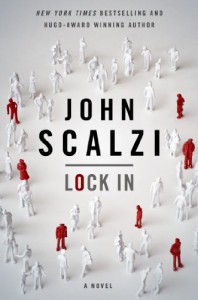Familiar Diversions
I'm a librarian who loves anime, manga, and reading a wide variety of genres.
Currently reading
Lock In by John Scalzi

Approximately 24 years prior to this book's present, the first Haden's syndrome cases began appearing. Many people got sick and died. Some got better and experienced no permanent effects. However, a portion of those who survived the second stage experienced lock in – they were still alive, but were essentially trapped inside bodies they could no longer control. An even smaller number of those who survived the second stage were outwardly unchanged, but had the ability to become Integrators, people who could allow those who were locked in to briefly borrow their bodies. Decades later, the disease still has no reliable vaccine.
Chris Shane is one of the best-known Hadens in the U.S., maybe on the entire planet. He became locked in when he was only a baby and was one of the first Hadens to regularly use a threep, an android body. In the book's present, he has joined the FBI in an effort to get out of his family's shadow and be more than a Haden celebrity. His very first day on the job includes a man who was possibly murdered by an Integrator, and a bombing at a facility researching drugs that might allow Hadens to have voluntary control of their bodies again. Meanwhile, tensions between Hadens and non-Hadens are rising as a bill is scheduled to go into effect that will cut many of the programs and subsidies that Hadens have depended on.
Lock In grabbed me enough that I read it in a day. Despite the massive infodumps, it felt very fast-paced. I wanted to know how everything tied together and who was behind it. Did it have something to do with Cassandra Bell, a famous Haden who became locked in while still in the womb and who opposed the new bill, or was there something else going on?
The world and premise were fascinating. It wasn't until the first scene in Chris's personal liminal space, when readers also got to learn a little more about the Agora (which, sadly, was explained more than shown), that I realized this felt an awful lot like either an artificial intelligence story or a “trapped in a virtual world” story. Basically, my catnip.
The depth of technological support for Hadens strained my suspension of disbelief. In only 24 years, people managed to come up with the Agora and relatively affordable threeps (I recall Chris saying they cost as much as cars, so I imagine not everyone would be able to afford one), and every Haden had a neural network (technology that allowed them to interface with threeps, Integrators, and the Agora). The massive amount of funding for all this was explained as being due to the First Lady developing Haden's and the fund-raising efforts of people like Chris's father. And it probably helped that everyone who experienced lock in experienced it in exactly the same way. Still. The level of work, organization, and funding was amazing compared to how well (or not) certain disabilities are supported in real life.
Unfortunately, I could definitely believe in people opposing all that funding. Although Chris was rich enough that reduced programs and subsidies would have no effect on him, there were constant reminders that it would on everyone else. I was more than a little horrified when one of Chris's housemates began talking about the possibility of ad-supported neural network software. Imagine being forced to see a few ads at the beginning of every day. Or, even worse, not being able to afford any updates and having to risk the software you need in order to interact with the world failing or getting hacked.
That leads me to some of the problems I had with this book. This was mainly a sci-fi thriller with great gobs of U.S. politics and techno jargon as it related to Hadens, which left very little time for the characters. As a reader, I want to become attached to the characters I'm reading about, and there just wasn't enough here. The best I got was Chris Shane's sense of humor, which I enjoyed, and his partner Vann's crappy past. (By the way, kudos to Scalzi for never once hinting at romance between the two of them. I like romance, but it wouldn't have worked at all here.) Aside from those two, it was mostly a blizzard of names. I found myself having to flip back a few pages to confirm who people were and what their jobs were a lot.
The story sped by so fast that I didn't realize until after I finished that a few things were left hanging. For example, what did Agent Vann do to piss off Detective Trinh so badly? What was the deal with the twins, Justin and Justine, sharing one body? One of Chris's housemates said he'd explain it to him later, but he never got the chance.
All in all, this was a fun read. The characters didn't really grab me, but I enjoyed the premise and the ending was fantastic. I'm looking forward to trying more of Scalzi's works.
(Original review, with read-alikes and watch-alikes, posted on A Library Girl's Familiar Diversions.)
 11
11












